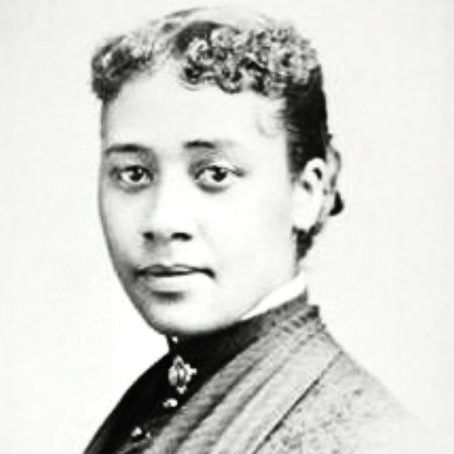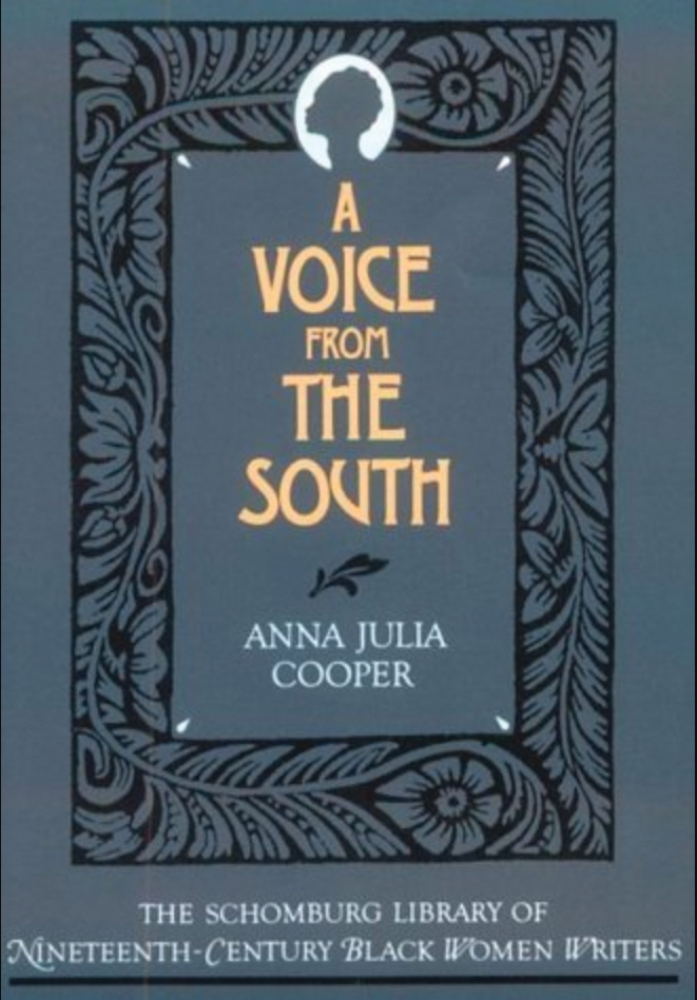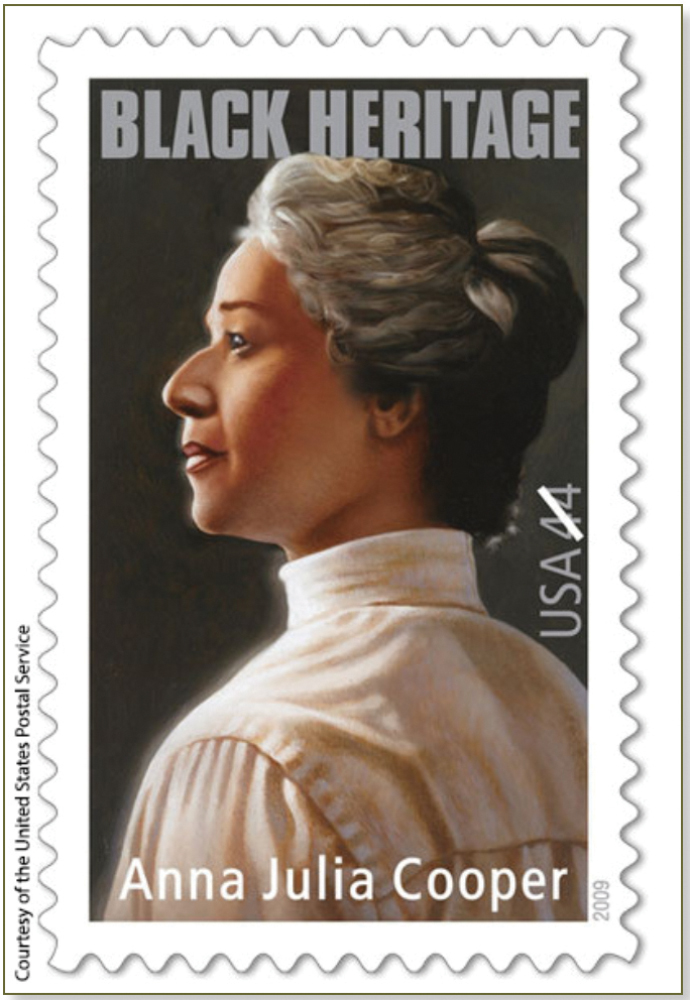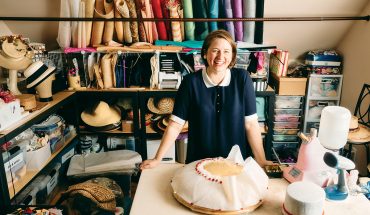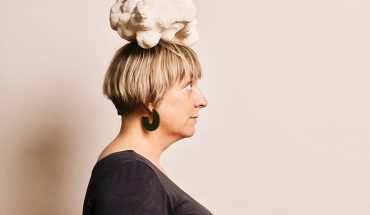Anna Cooper has serendipitously appeared to me in many forms — and her life’s story is a gift that I will gladly pay forward.
by Colony Little
I first met Anna Cooper while getting coffee one Saturday afternoon in January. I was about two blocks away from the Old City Cemetery on North East Street and East Edenton when our paths crossed at a historical marker that read:
Anna J. Cooper
1858-1964
Educator, orator, & early
black feminist. Graduate,
St. Augustine’s. Author,
A Voice from the South
(1892). Grave 2½ blks. S.
One hundred and five years. That alone gave me pause as I imagined a life lived between the bookends of slavery and civil rights. Bounded by these two momentous chapters in American history, Anna Julia Cooper established herself as a writer, an activist, and a lifelong learner dedicated to education and service. The historical marker was one hell of an elevator pitch.
I admit the manner in which I made her acquaintance was unorthodox. But in that moment, finding myself in the presence of her memory was a gift. First impressions are fleeting, yet the six short lines of her historical marker challenged me to learn more. Since that initial meeting, I found a copy of A Voice from the South: By a Black Woman of the South; Cooper’s writing connected me to an important element of Raleigh’s history that had previously been hidden.
Since that afternoon in January, Cooper has serendipitously reappeared to me in many forms. Her life’s story is a gift that I will gladly pay forward to anyone who hasn’t yet had the pleasure to meet this phenomenal woman.
Since that afternoon in January, Cooper has serendipitously reappeared to me in many forms. Her life’s story is a gift that I will gladly pay forward to anyone who hasn’t yet had the pleasure to meet this phenomenal woman.
Anna Julia Cooper (née Haywood) was born into slavery in Raleigh in 1858 and died in Washington, D.C., in 1964. In those intervening years she was educated at Saint Augustine’s University, where as a child she tutored and taught classes before the age of 14. She was one of the first African American women to earn a degree from Oberlin College in 1884; in 1888, she earned a Master’s degree in mathematics from Oberlin, and in 1925, Cooper received her doctorate at the College of Sorbonne in Paris.
As a published writer, Cooper was an ardent supporter of Black feminism, publishing one of the earliest texts that identified the unique intersectional issues Black women faced fighting for equality and suffrage while being relegated to tertiary footnotes in the struggle for civil rights. While her numerous accomplishments privileged her access among the rarefied circles of Black intellectual elites, her activism and unwavering thirst for knowledge would only be quenched through her unselfish acts of service.
For Cooper, love was epitomized by her mother, Hannah Stanley Haywood. In Cooper’s autobiographical accounts of her childhood, she described her mother as “the finest woman I have ever known.” Both mother and daughter were enslaved, and looming over Cooper’s parentage was the reality behind her paternal lineage — her father was likely their owner, Fabius J. Haywood Sr. The question of paternity was held in secret and shame, and Cooper could only rely on conjecture as the closest measure of certainty.
Despite this, Cooper thrived under her mother’s care, receiving a scholarship from an Episcopal priest to attend Saint Augustine’s Normal School and Collegiate Institute as one of the school’s earliest pupils. “That school was my world during the formative period, the most critical in any girl’s life,” wrote Cooper in her book.
Cooper’s experience with Saint Augustine’s became the foundation for her teaching ethos, as she wrote: “to hold a torch for the children of a group too long exploited and too frequently disparaged in its struggling for the light.” She married George A.G. Cooper at 19 and became a widow at age 21, at which time she left Raleigh to attend Oberlin College in Ohio. While she did not have biological children, Cooper fostered nieces and nephews and nurtured countless young minds, offering them the same pathways to education that were afforded to her at a young age. As an educator, Cooper taught French, German, Greek, Latin, and mathematics.
Early in her academic pursuits, Cooper was discouraged from studying Greek and other fields that were assumed to fall within the purview of her male counterparts. It was at Saint Augustine’s where Cooper first experienced the double bind of racism and sexism that prompted her intellectual exploration of intersectionality. This work later evolved into womanism and Black feminist theories popularized by writers like Alice Walker and Barbara Christian, who continued to radically expand the narrow scope of feminist thought. As Cooper explains in an essay titled “The Status of Woman in America”:
The colored woman of to-day occupies, one may say, a unique position in this country. In a period itself transitional and unsettled, her status seems one of the least ascertainable and definitive of all the forces which make for our civilization. She is confronted by both a woman question and a race problem and is as yet an unknown or an unacknowledged factor in both.
Her unflinching critiques of Black men and white suffragettes were groundbreaking and radical for the time, and she rendered these critiques with the intention of collective uplift versus destructive, selfish gain: “Only the Black Woman can say ‘when and where I enter, in the quiet, undisputed dignity of my womanhood, without violence and without suing or special patronage, then and there the whole Negro race enters with me.’”
As a prolific writer, Cooper opined on issues relating to religion, equality, and education. Her point of view on higher education for African Americans was deemed controversial among the prevailing schools of thought epitomized by Booker T. Washington and W.E.B. Du Bois. During Reconstruction, strategies for achievement and economic liberation were bifurcated between Washington’s philosophy of industrial education and Du Bois’ theory of exceptionalism. Cooper’s ability to parse out the intersectional issues of racism and sexism that prevented Black women from traversing either path led her to champion both. As an educational leader, Cooper facilitated access to higher education and industrial trades during her tenure as the principal of the M Street High School in Washington, D.C., one of the largest college preparatory schools for Black students in the nation.
She also championed access to higher education at elite schools such as Brown, Harvard, and Yale Universities. Her support of liberal arts through college preparatory coursework was controversial and led to philosophical fissures among her peers that culminated in her ousting as president. Undaunted, she pursued other administrative roles in education and ultimately returned to teaching. It was during this time she earned her doctorate degree at the Sorbonne, at the age of 67.
Cooper traveled to Europe for the first time in her 40s, to attend the first Pan-African Congress in London and the 1900 Paris Exposition, also known as the World’s Fair. This initial sojourn in Europe led to frequent trips abroad in the early 1900s, preceding the mass migration of African Americans to Paris during World War I. Her affinity for studying and traveling abroad was likely due in part to the support she obtained for pursuing her doctorate overseas, compared with the limitations placed on her when she pursued advanced degrees in the United States. It certainly raises questions about how she experienced freedom in the U.S. and abroad. Ironically, a clue to this question of freedom can be found on page 27 of all U.S. passports, which includes this quote from Cooper in its design: “The cause of freedom is not the cause of a race or a sect, a party or a class — it is the cause of humankind, the very birthright of humanity.”
As symbolic keys to discovery, passports unlock the mysteries that lie beyond our shores. The presence of Cooper’s quote in the U.S. Passport is a powerful testament to her dedication to the pursuit of knowledge. I recently stumbled on the quote when I used my own passport to obtain a North Carolina driver’s license. Remember when I said that Cooper reappeared to me numerous times? When I received my temporary license, someone told me, “Congratulations, you’re a North Carolinian now.” Ms. Cooper welcomed me with her words and her enduring legacy. The prologue to her life’s story was one of bondage, while her epilogue was one of freedom. Her unyielding quest for knowledge is a journey that I will gladly continue to pursue in her honor.
What started out as a chance encounter has turned into a most unexpected mentorship. Through her life’s work, Cooper provided me with another prism through which I can view the world, revealing the countless women whose lives have been overshadowed by voices that were louder with perspectives that were deemed more powerful and influential than theirs. Despite this, these women continued their work, remaining steadfastly committed to selfless service.
When I catch myself comparing my work to others, I’m reminded of the simple words of encouragement from one of my living mentors: “Just do the work.” Unbound from these self-imposed constraints, I am free to create and explore. To me, Cooper also represents a legacy of support and sacrifice handed down for generations through our mothers, grandmothers, aunts, cousins, and sister-friends who nurture our families and communities. That historical marker was an introduction I will never forget.
Anna J. Cooper introduced me to a part of Raleigh’s history that could have remained a footnote; instead she left behind a rich trove of knowledge and insight to anyone who’s willing to sit and listen.
This article originally appeared in BOS Magazine, the publication of Raleigh’s Black Oak Society. Learn more at blackoaksociety.com.

